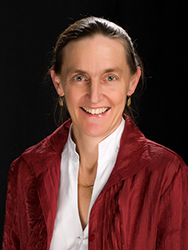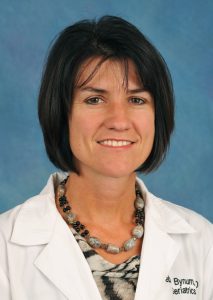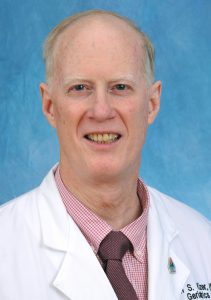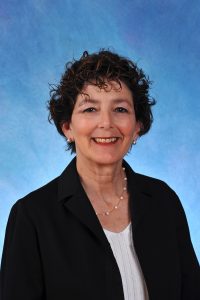
Laura C. Hanson, MD, MPH
Dr. Laura Hanson’s primary research interest has been to understand and improve the quality of palliative care for frail elders, with a focus on dementia care and cancer care—work at the intersection of Geriatrics and Palliative Medicine. Finding new ways to deliver high quality care with ethically appropriate decision-making is critical to the US healthcare system, and to the well-being of patients and families. Her research primarily involves clinical trials and quality improvement intervention studies to test ways to improve outcomes. Research projects have included an NIH-funded randomized controlled trial to improve decision making about feeding options in advanced dementia, development of community supportive care for African-Americans with cancer, quality improvement with triggered Palliative Care for Stage IV cancer, and a CMS-funded contract for the development and application of quality of care measurement methods for hospice and palliative care patients. Her research publications have appeared in the Journal of the American Medical Association, Annals of Internal Medicine, Journal of the American Geriatric Society, and in leading palliative care journals. She currently serves as Chair of the Research Committee for the American Geriatrics Society, overseeing research advocacy as well the abstract reviews and scientific content of the annual meeting of this organization.
Dr. Hanson’s most recent clinical trial is a study of a Goals of Care decision aid intervention for nursing home residents with advanced dementia. This study, published in JAMA Internal Medicine, tested a video decision aid followed by a structured discussion between nursing home staff and families for effects on decision-making and clinical care. Families in the intervention arm experienced improved quality of communication with clinicians, and nursing home treatment plans incorporated more elements of palliative care. Nursing home residents with advanced dementia were hospitalized half as frequently, but did not have any change in duration of survival as a result. She is now also working on an NIA-funded pilot clinical trial of Palliative Care consultation for advanced dementia patients at UNC Hospitals.
In the next few decades, opportunities for research in geriatrics and palliative care will grow rapidly. This research has resulted in many exciting potential collaborative opportunities with UNC faculty in the Sheps Center for Health Services Research, the Center for Aging and Health, the Lineberger Comprehensive Cancer Center, the Division of Pulmonary Medicine, the Department of Pediatrics, the Department of Family Medicine, and the Schools of Nursing and Social Work. In addition, UNC houses the Measures Core for the first NIH-funded cooperative trials network for palliative care – the Palliative Care Research Cooperative group – permitting a new level of scientific study for interventions in pain and symptom management, communication, and decision-making. Dr. Hanson welcomes opportunities to work with new and established investigators who are interested in improving the care of frail and medically complex older patients
Trevor A. Jolly, MBBS

Dr. Trevor Jolly is an Assistant Professor in the Divisions of Geriatric Medicine and Hematology/Oncology and care provider in the Geriatric Oncology Specialty Clinic. Dr. Jolly also serves as the lead instructor for the Geriatric Oncology medical student selective. He earned his medical degree at the University of the West Indies, Trinidad. He performed his residency training in Internal Medicine at the New York Methodist Hospital, Weill Cornell Medical College. He completed subspecialty clinical training in geriatric medicine at the University of Alabama. After He then came to UNC-CH as a research fellow in geriatric medicine and as a clinical fellow in medical oncology. He is a former John A. Hartford Center of Excellence in Geriatric Medicine Scholar and a former Ruth L. Kirschstein National Service Research Award appointee. Dr. Jolly was hired in 2013 as the first dual board certified geriatric oncologist at UNC Chapel Hill.
Dr. Jolly’s research focuses on optimizing care for older adults with cancer. He was integral in the development of a registry (LCCC 0916) for older cancer patients who complete a validated, brief, predominantly self-administered geriatric assessment (GA). He was involved in the conduct of preliminary research that established the feasibility of this GA tool in a busy multidisciplinary tertiary referral cancer center clinic and in community oncology practices. Using this registry, he identified interesting referral patterns, associations between undesirable health behaviors and GA-identified deficits, in addition to disagreements between observer- and self-rated performance status (PS). As a result, Dr. Jolly determined that self-rated performance status is an insensitive measure of functional status which does not correlate well with GA-identified impairments. Currently, Dr. Jolly is conducting a randomized, controlled intervention trial (LCCC 1538) of real time GA reporting in non-electively hospitalized older cancer patients. He helped develop a mobile web/tablet-based software platform for administering a mostly patient reported GA. This mobile web/tablet-based software platform generates in real-time a GA report which includes evidence based recommendations for intervention on GA-identified deficits. His research highlights growing needs in the care of older cancer patients and aligns with his long term goal of becoming a leader in the field with expertise in research and the care of older cancer patients.
Debra Bynum, MD

Dr. Debra Bynum is an Associate Professor of Internal Medicine and serves as the Director for the Internal Medicine Residency Program. Her scholarly work and research interests focus around medical education. Dr. Bynum completed a Master of Science in Medical Education and Leadership in 2015, funded by the Joseph M. Craver Medical Alumni Distinguished Teaching Professorship Award.
Past work has focused on medical students, fellows, and residents. As the prior co-director for the Clinical Skills course for pre-clinical medical students, she was able to demonstrate that a structured workshop and a specific rubric could improve the quality of medical student notes. This work was presented nationally at the plenary session for the Clerkship Directors in Internal Medicine in 2014, published in 2015, and made available for other educators via MedEd Portal. Her work to identify at risk medical students before their clinical clerkships with a structured oral exam has been presented at a national workshop and the manuscript is currently under review.
In an effort to determine whether or not residents were meeting expectations for quality care of older adults based upon American Geriatrics Society guidelines, Dr. Bynum led a multi-institutional study with Emory, Duke, University of Washington, and Wake Forest University and was the lead author of the study’s publication in the Journal of the American Geriatrics Society. Based upon this work, she is currently mentoring a project further examining the impact that a structured curriculum for geriatric assessments combined with templated discharge summary notes has on what was identified as areas of need.
Dr. Bynum’s work as the Residency Program Director has focused on improving resident evaluations using milestones data and the use of an electronic program portfolio to assist in the ACGME programmatic level self-study process. This work has resulted in two national workshop presentations. Most recently, she and Dr. Cristin Colford, Associate Program Director for the Residency Program, have been working to improve the recruitment and retention of under-represented minority (URM) students into Internal Medicine residency, fellowship, and beyond. As part of this project, Drs. Bynum and Colford have joined a group of educational leaders from Duke, Morehouse, ECU, and WFU supported by grant funding through the Alliance for Academic Internal Medicine (AAIM) to further examine, study, and address the needs of URM residents in IM programs across the state.
J. Stephen Kizer, MD

Dr. John Stephen Kizer is Professor of Medicine, Vice Chief of the Division of Geriatric Medicine, and Medical Director of the Geriatrics Specialty Clinic. He has a long and distinguished research career spanning basic science to clinical and translational science. His early work focused on neurotransmitter activity in the rat brain and was supported by NIH funding. His current research is in the area of transitions of care. For the past few years he has led a research group comprised of investigators from the Division of Geriatric Medicine, the Department of Emergency Medicine, the School of Public Health, and The Odum Institute. This research was designed with the goal to improve the care of older adults after discharge from the Emergency Department (ED.) Because these patients are at risk for further medical problems in the ensuing months, including death and readmission to the Hospital, our multidisciplinary group conducted a three and one-half year randomized control trial of telephonic follow-up to determine if this risk could be reduced. The intervention was a telephone call by registered nurses to 2,000 older patients recently discharged from the Emergency Department and its purpose was to help these older patients better understand ED discharge instructions, obtain follow-up appointments and to identify barriers to obtaining medicines. The results of this study are currently being finalized.
Dr. Kizer is an outstanding educator, having received multiple awards for teaching by medical students and Internal Medicine house staff. He was named the Whitehead Society lecturer in 2000 and received the lifetime achievement award from the Academy of Educators for Teaching Excellence in 2014. Since 1989, Dr. Kizer has directed the Howard Holderness Distinguished Medical Scholars Program.
Ellen Roberts, PhD, MPH

Dr. Ellen Roberts is an Associate Professor of Medicine in the Division of Geriatric Medicine and the Coordinator of Geriatric Medicine for the Center for Aging and Health. Dr. Roberts is the Geriatric Coil Director for the Office of Medical Education’s new TEC curriculum and the Director of the Senior Mentor Program. Her training is in Public Health with expertise in health promotion, health education and behavior change. Her personal goal is to serve the older adult population by contributing to the development of our health professionals’ training in knowledge, skills and attitudes in the areas of geriatrics and gerontology. Dr. Roberts’ path has involved educational research in the areas of curriculum development, implementation and evaluation, and training and teaching learners from many disciplines and levels, from faculty to undergraduate students.
Currently, Dr. Roberts is Co-Principal Investigator with Dr. Jan Busby-Whitehead on a large ($2.5 million) collaborative agreement with the Bureau of Health Professions (BHPr), Health Resources and Services Administration (HRSA.) The project is entitled “Carolina Geriatrics Workforce Enhancement Program (CGWEP).” CGWEP addresses the needs of North Carolina’s elders, families, and caregivers by developing and integrating geriatrics and interprofessional teamwork into primary care systems. The collaborating partners, Piedmont Health Services (PHS), Inc., Area L AHEC, and Southeast AHEC, are transforming primary care through integrating geriatrics clinical training and education into sites that are rural, underserved, and with diverse patient populations. To increase the geriatrics workforce pipeline, a new 2-year fellowship program for nursing, geriatric medicine, and dentistry trainees has been implemented, currently with 6 Geriatrics Interprofessional Fellows. Interprofessional geriatrics curricula has been developed and implemented at all six health sciences schools at UNC-CH, at PHS, Inc. and at AHEC primary care sites, using both local interprofessional teams and online curricula to reach students and a broader workforce. In addition, the 9 AHEC community partners along with the NC American Indian Health Board, Alzheimers North Carolina, Inc., and the Alzheimer’s Association, are bringing education and training in geriatrics, especially about Alzheimer’s disease and related dementias (ADRD), to targeted populations statewide. Since 2010, the number of learners trained with continuing education is 21,216 participants and growing.
Dr. Roberts is the Associate Program Director and Evaluator for the National Institute on Aging (NIA), “UNC-CH Summer Research Training in Aging for Medical Students” (MSTAR), a T35 grant, awarded as a renewal grant in 2015 (PI, Jan Busby-Whitehead, MD). To date, UNC-CH has trained 59 medical students from all over the USA. Of these trainees 50% are UNC-CH students. The MSTAR Program provides medical students with an enriching experience in aging-related research and geriatrics, with mentorship from over 45 top UNC Chapel Hill researchers from multiple departments and schools who are pursing academic careers in aging, ranging from basic sciences to clinical research to health services research.
Dr. Roberts is also an Investigator on a transitions of care project currently funded by The Duke Endowment, The William R. Kenan, Jr. Charitable Trust, and The John A. Hartford Foundation. The goal of this project is to improve the care of older adults (65 years of age or older) after discharge from the Emergency Department (ED.)